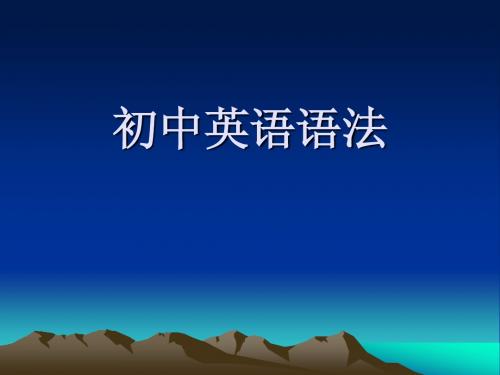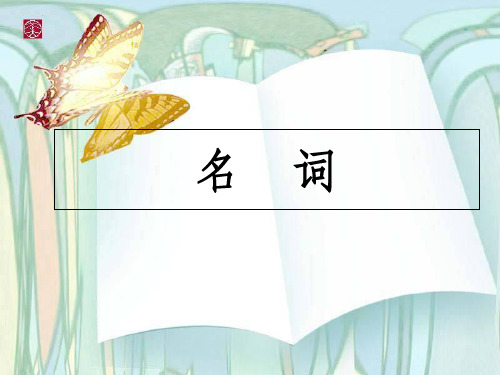初中英语语法讲解精ppt课件
合集下载
初中英语语法系列课件 一般现在时 课件 (共51张PPT).ppt

More
课后活动一
你收到了一条微信消息……
Ann is one of your best friends. One day, you received a message from her. She had an accident and was in hospital yesterday.
If you visit Ann tomorrow, what will you do?
语法秘籍
一般现在时态的用法 (1) 表示经常,反复发生或习惯性动作。 He usually walks to school.
语法秘籍
every 系列
every morning every afternoon every evening every night
every day every week every month every year
happening all the time or repeatedly.
故事再现
Sally usually walks to school. She passes the sweet shop, but she never buys sweets on the way to school. She often comes home with her friend Kate. Then they go into the sweet shop and spend some of their pocket money.
• 频率词组系列:once a week,twice a week,three times a week,four times a week
知识清单
一般现在时的用法
• 表示经常,反复发生或习惯性动作。 • 表示客观真理或永恒的状态。 • 表示根据规定时间表,预计要发生的动作。 • 在时间或条件状语从句中,用一般现在时表示一般将来时。
课后活动一
你收到了一条微信消息……
Ann is one of your best friends. One day, you received a message from her. She had an accident and was in hospital yesterday.
If you visit Ann tomorrow, what will you do?
语法秘籍
一般现在时态的用法 (1) 表示经常,反复发生或习惯性动作。 He usually walks to school.
语法秘籍
every 系列
every morning every afternoon every evening every night
every day every week every month every year
happening all the time or repeatedly.
故事再现
Sally usually walks to school. She passes the sweet shop, but she never buys sweets on the way to school. She often comes home with her friend Kate. Then they go into the sweet shop and spend some of their pocket money.
• 频率词组系列:once a week,twice a week,three times a week,four times a week
知识清单
一般现在时的用法
• 表示经常,反复发生或习惯性动作。 • 表示客观真理或永恒的状态。 • 表示根据规定时间表,预计要发生的动作。 • 在时间或条件状语从句中,用一般现在时表示一般将来时。
初中英语语法大全课件

(1)构成名词的后缀常用的有-ence,-(e)r/ -or (从事某事的人),-ese (某地人),-ess (雌性),-ful (一……),-ian (精通……的人),-ist (专业人员),-ment (性质;状态),-ness (性质;状态),-tion(动作;过程)等。例如: differ不同于→difference区别 write写→writer作家 Japan日本→Japanese日本人 act表演→actress女演员 mouth口→mouthful一口 music音乐→musician音乐家 racial种族的----racialist种族主义者
01
合成形容词
02
名词+形容词snow-white雪白的
03
名词+现在分词English-speaking讲英语的
04
名词+to+名词face-to-face面对面的
05
名词+过去分词man-made人造的
06
数词+名词one-way单行的
07
数词+名词+形容词two-year-old两岁的
动词转化为名词
很多动词可以转化为名词,大多意思没有多大的变化(如下①);有时意思有一定变化(如下②);有的与一个动词和不定冠词构成短语,表示一个动作(如下③)。例如:
Let's go out for a walk.我们到外面去散散步吧。
He is a man of strong build.他是一个体格健壮的汉子。
构成副词的常用后缀有-ly (主要用于形容词之后表示方式或程度),-ward(s) (主要用于表示方位的词之后表示方向)。
例如:
angry生气的→angrily生气地
to到→towards朝……,向……
初中英语零基础学语法--英语句子结构 课件(共43张PPT)

附属成分
基本成分的修饰语。可以是: • 定语:即用来修饰名词的单词、短语或从句 • 状语:即用来修饰名词或代词以外的词的单词、短语或从句。
定语
Poor John tottered toward a hospital nearby. She likes oranges imported from the USA.
省略成分
句中被省略的成分,虽然未说出来,却在句中表示 一定的意思:
(You) Come here. (I wish you)Good luck! Some gave him praises,but others(gave him)rotten eggs.
He runs as fast as, if ( he does ) not ( run ) faster, than you. ( I ) Hope you like it. John should clean the room today and Peter ( should clean it ) tomorrow.
主语、动词(不及物动词、及物动词、双宾动词、系动词、宾 补动词)、宾语及补语可以称为基本句子成分。完整的句子一 般至少包含2个基本成分,至多4个基本成分。
Vi(不及物动词)
主 语
谓 语
Vt(及物动词)
宾语 宾语(直) 宾语(间) 宾语 宾补
系动词
表语
be / feel / seem / look appear / stand / lie become /get / grow / turn go / come / remain/ keep taste / smell etc.
连接成分
连接成分实际上是一个连词,用来连接两个或几个平行的词、
初中英语语法讲解PPT课件

双重所有格(of+’s的两种结合)
• P11-13 (textbook) • 做练习 • 作业 列出有关名词一讲疑惑不解或易错的5- 10个难点.
第二讲 冠词和数词
•
冠词是虚词,本身不能单独使用,也没有词义,它用在名词的前面,帮助指明名词 的含义。英语中的冠词有三种,一种是定冠词(the Definite Article),另一种是不定 冠词(the Indefinite Article),还有一种是零冠词(Zero Article)。 2.1不定冠词的用法 不定冠词a (an)与数词one 同源,是"一个"的意思。a用于辅音音素前,一般读作 [e],而an则用于元音音素前,一般读做[en]。 1) 表示"一个",意为one;指某人或某物,意为a certain。 A Mr. Ling is waiting for you.
2) 以o 结尾的名词,变复数时: a. 加s,如: photo---photos piano---pianos radio---radios zoo---zoos; b. 加es,如:potato--potatoes tomato--tomatoes c. 均可,如:zero---zeros / zeroes 3) 以f或fe 结尾的名词变复数时: a. 加s,如: belief---beliefs roof---roofs safe---safes gulf---gulfs; b. 去f,fe 加ves,如:half---halves knife---knives leaf---leaves wolf---wolves wife---wives life---lives thief---thieves; c. 均可,如: handkerchief: handkerchiefs / handkerchieves
中考英语语法 代词 课件 (共43张PPT)

Байду номын сангаас
4.指示代词:表示时间和空间远近关系的代词叫指 示代词。见下表
指示代词可在句中作主语、宾语、表语、定语等。例如: Those are my parents. (作主语) Throw it like that. (作表语) The toys little Tom likes are those in the basket. (作表语) These pictures are drawn by an old blind man. (作定语)
③人称代词 she 可以用指代祖国、大地、月亮、轮船等。 例 如:The ship is leaving. She’s on her first trip to Boston. 轮船要起航了。 这时她第一次去波士顿。 We love our country, we hope she’ll be stronger and stronger. 我们热爱我们的祖国,我们希望她越来越强大。 ④It 作为人称代词时,可以表示天气、距离、时间、环境等。 例如:It is about 10 kilometres from here. 离这儿大约有 10 公里。
注意:①人称代词 we, you, they 可以用来表示一般人。例如: You cannot go into the hall with slippers. 不准穿拖鞋进入大厅。 ②人称代的主格作表语,一般都在正中的谈话中, 表示强调。 例如:It was he who took away the necklace. 是他拿走了那条 项链。
05
练习
1.This isn’t ______ pencil case. I left ______ at home.
A. my, mine
4.指示代词:表示时间和空间远近关系的代词叫指 示代词。见下表
指示代词可在句中作主语、宾语、表语、定语等。例如: Those are my parents. (作主语) Throw it like that. (作表语) The toys little Tom likes are those in the basket. (作表语) These pictures are drawn by an old blind man. (作定语)
③人称代词 she 可以用指代祖国、大地、月亮、轮船等。 例 如:The ship is leaving. She’s on her first trip to Boston. 轮船要起航了。 这时她第一次去波士顿。 We love our country, we hope she’ll be stronger and stronger. 我们热爱我们的祖国,我们希望她越来越强大。 ④It 作为人称代词时,可以表示天气、距离、时间、环境等。 例如:It is about 10 kilometres from here. 离这儿大约有 10 公里。
注意:①人称代词 we, you, they 可以用来表示一般人。例如: You cannot go into the hall with slippers. 不准穿拖鞋进入大厅。 ②人称代的主格作表语,一般都在正中的谈话中, 表示强调。 例如:It was he who took away the necklace. 是他拿走了那条 项链。
05
练习
1.This isn’t ______ pencil case. I left ______ at home.
A. my, mine
初中英语语法课件ppt

vacation together.
过去将来时的使用:
一、过去将来时表示对于过去某一时间而言将要发生的动 作或存在的状态。 would或was /were going to + V
would可用于各种人称。
二、would +V还可表示过去的习惯动作,在这点上同used to同义。
When we were children, we would/used to go swimming every summer.
e) 用于条件从句“如果……想,设想”(接近if ……want to,或 if ……should) 例:Greater efforts to increase agricultural production must be made if food shortage ____________ avoided. A) is to be B) can be C) will be D) has been
一般现在时的动词形式: 动词原形 1.am;is ;are 2.have,has 3.第三人称单数形式-(e)s
肯定句:I watch television every day.
否定句:I don’t watch television every day.
疑问句:Do you watch television every day.
一般现在时的使用:
1.一般现在时表示总是、通常、习惯 性的动作或状态。
It snows in winter. I watch television every day.
2.用于对客观事实的普遍性的陈述。
Water consists of hydrogen and oxygen. Most animals kill only for food. The world is round.
过去将来时的使用:
一、过去将来时表示对于过去某一时间而言将要发生的动 作或存在的状态。 would或was /were going to + V
would可用于各种人称。
二、would +V还可表示过去的习惯动作,在这点上同used to同义。
When we were children, we would/used to go swimming every summer.
e) 用于条件从句“如果……想,设想”(接近if ……want to,或 if ……should) 例:Greater efforts to increase agricultural production must be made if food shortage ____________ avoided. A) is to be B) can be C) will be D) has been
一般现在时的动词形式: 动词原形 1.am;is ;are 2.have,has 3.第三人称单数形式-(e)s
肯定句:I watch television every day.
否定句:I don’t watch television every day.
疑问句:Do you watch television every day.
一般现在时的使用:
1.一般现在时表示总是、通常、习惯 性的动作或状态。
It snows in winter. I watch television every day.
2.用于对客观事实的普遍性的陈述。
Water consists of hydrogen and oxygen. Most animals kill only for food. The world is round.
初中英语语法PPT课件

第四章 限定词
• 限定词分前中后,倍数分数是 前位,冠词算是中位词,还有指代 和物代;基数序数相关词,都作后 位限定词。前位中位只一个,后位 可以有多个。
• 三类限定词的搭配顺序为: • 前位——中位——后位。
冠词(Article)
• • • • • • • • 1)定冠词的用法。 特指都熟悉,上文已提及; 世上独无二,序数最高级; 普通变成专用名,方位only弹乐器。 零冠词的用法。 专有名词不可数,学科球类三餐饭; 复数名词表泛指,节日星期月份前; 颜色语种和重复,称呼习语加头衔。
第五章 代词
• • • • • • • • 注意事项 (1)当人称代词在分裂句中作中心成分时,常用作主格。 It is he who did it. 但在非正式语体中也可用宾格。 It is me that did it. (2)当句子主语为“everybody/nobody+but/except+人称代词”的 结构时,只要出现在主语位置常用主格。 Nobody but she can solve our problem.只有她能解决我们的问题。 Everybody except he agreed to the idea.除他之外每个人都同意这个 主意。 但若主语被分隔而此短语出现在句尾时,则用宾格。 Nobody but she can solve our problem but her. Everybody except he agreed to the idea except him. 用作句子宾语时,只能用宾格。 I interviewed everybody but him.除他之外我请了每个人。
• • • •
• • •
•
巧记单数变复数时不同形的名词: 男女脚步牙鹅,老鼠孩子加虱婆。 man-men woman-women foot-feet tooth-teeth; goose-geese mouse-mice louse-lice childchildren 同形的有: 中日人民爱护羊,鹿鱼单复都一样。 sheep-sheep deer-deer fish-fish JapaneseJapanese Chinese-Chinese
初中英语语法PPT精品课件

day .
• 练习题:
• 1. Li Ming said he _____happy if Brian_____to China ne xt month.
• A. as; come B. was; would come C. would be; came D.
will be; come
• 2. Jenny said she _____her holiday in China.
• 例句: • Are you going to read ? • He is coming tomorrow .
• 练习题:
• 1. There __________ a meeting tomorrow after noon. A. will be going to B. will going to be C. is going to be D. will go to be
• 2. Charlie ________ here next month.
• A. isn't working B. doesn't working C. isn't g oing to working D. won't work
• 3. He ________ very busy this week, he _____ ___ free next week.
• A. will be; is B. is; isБайду номын сангаасC. will be; will be D. is; will be
现在完成时
• 构成: • have / has +PP • have/has been+doing
• 用法: • 发生在过去影响在现在的动作或状态等
• 练习题:
• 1. Li Ming said he _____happy if Brian_____to China ne xt month.
• A. as; come B. was; would come C. would be; came D.
will be; come
• 2. Jenny said she _____her holiday in China.
• 例句: • Are you going to read ? • He is coming tomorrow .
• 练习题:
• 1. There __________ a meeting tomorrow after noon. A. will be going to B. will going to be C. is going to be D. will go to be
• 2. Charlie ________ here next month.
• A. isn't working B. doesn't working C. isn't g oing to working D. won't work
• 3. He ________ very busy this week, he _____ ___ free next week.
• A. will be; is B. is; isБайду номын сангаасC. will be; will be D. is; will be
现在完成时
• 构成: • have / has +PP • have/has been+doing
• 用法: • 发生在过去影响在现在的动作或状态等
初中英语语法大全精品PPT课件

多时,谓语用复数。 如:There is a sheep in the yard.(院子里有只绵羊)
There are some sheep in the yard.(院子里有一些绵羊) 4、maths, news等虽然有s结尾,但不是复数,因此谓语仍用单数: 如:The news is very exciting. (这个消息令人兴奋)
[注解]:
① ‘s还可以表示某人的家或者某个店铺, 如:my aunt’s(我阿姨家), the doctor’s(诊所)
② 两人共有某物时,可以采用 A and B’s 的形 如:Lucy and Lily’s bedroom(露西和丽丽合住的卧室)
Lucy’s and Lily’s bedroom(露西和丽丽分别的卧室)
如果表示整体概念,则谓语用单数形式, 如:Class Three is a very good class.(三班是好班) 如果表示其中的所有成员时,则谓语用复数形式, 如:Class Three have a map of China.(三班有张中国地图) 3、Chinese, Japanese, fish, sheep, people等表示单个时谓语用单数,表示许
如: box, child, orange;
不可数名词{u} 是不可以用简单的数词进行计数的名词。
如:water, news, oil, population, information .
英语可数名词的单复数
1、名词由单数变复数的基本方法如下: ①在单数名词词尾加s。 如:map → maps,boy→ boys,horse→ horses, table→ tables. ②s,o,x ,sh,ch结尾的词加es. 如:class→classes, box→boxes, hero→heroes, dish→dishes,
There are some sheep in the yard.(院子里有一些绵羊) 4、maths, news等虽然有s结尾,但不是复数,因此谓语仍用单数: 如:The news is very exciting. (这个消息令人兴奋)
[注解]:
① ‘s还可以表示某人的家或者某个店铺, 如:my aunt’s(我阿姨家), the doctor’s(诊所)
② 两人共有某物时,可以采用 A and B’s 的形 如:Lucy and Lily’s bedroom(露西和丽丽合住的卧室)
Lucy’s and Lily’s bedroom(露西和丽丽分别的卧室)
如果表示整体概念,则谓语用单数形式, 如:Class Three is a very good class.(三班是好班) 如果表示其中的所有成员时,则谓语用复数形式, 如:Class Three have a map of China.(三班有张中国地图) 3、Chinese, Japanese, fish, sheep, people等表示单个时谓语用单数,表示许
如: box, child, orange;
不可数名词{u} 是不可以用简单的数词进行计数的名词。
如:water, news, oil, population, information .
英语可数名词的单复数
1、名词由单数变复数的基本方法如下: ①在单数名词词尾加s。 如:map → maps,boy→ boys,horse→ horses, table→ tables. ②s,o,x ,sh,ch结尾的词加es. 如:class→classes, box→boxes, hero→heroes, dish→dishes,
初中英语语法专题课件完整版(共983张PPT)

2.不规则变化
构成方法
例词
形式不变 (单复数同形)
sheep-sheep deer-deer Chinese-Chinese Japanese-Japanese
变内部元音字母
foot-feet tooth-teeth goose-geese man-men mouse-mice
词尾加-en/-ren
a group of 一队,一组,一群
②还可用much,little,a little of,a large amount/deal of, no,plenty of等来修饰不可数名词,some,any既可修饰可数名词也可修 饰不可数名词。
much money,plenty of water a little of air some(肯定句): some milk ,some apples any(疑/否):Are there any stamps?I don’t have any money (5)数词-名词-形容词构成的复合形容词,中间的名词不能用
普通名词又可分为下面四类:
1)个体名词:表示单个人或单个事物。 如:gun、kid 、book。 2)集体名词:表示一群人或一些事物组成的集合体。 如:family。
3)物质名词:表示无法分为个体的物质、材料、食品、饮料、液体、气体、 金属等名称的名词,
如:pork、wood、bread、water、air。 4)抽象名词:表示动作、状态、品质、感情等抽象概念及学科、疾病。 如:work 。Hunger、honesty 、love、Chinese、success、HIV。 个体名词和集体名词可以用数目来计算,称为可数名词。
f,fe 为v,再加 -es
shelf-shelves thief-thieves
《初中英语语法》PPT课件

We know (that)we should learn from each other. Please tell me if/whether you have been to America. Could you please tell me where the restrooms are? 引导词是从句的一个成份,所以用哪个引导 词,看从句成份是 否完整,不完整,一定是特殊疑问句。完整,判断主句语气, 是疑问语气,用if/whether; 是肯定语气,用that.
2:用that, if/whether, how,where,what,….等连接词填 空.
that they will visit our school next week. 1.I hear_____
who the girl is? 2.Do you know_____ how can get to the park? 3.Could you tell me _____I 4.We thought ______you had never been there before . that 5.Please tell me_______ you live. where 6.Mother asked me ___________ I had finished my if/whether homework.
why 7.Do you know_____ she is angry? what 8.The teacher asked_____ your name was. how old
9.Tom is ten.I want to know _________ you whether are.
10.He asked you_______ you were a student or not.
初中英语语法大全-PPT

9.(2011·上海)These natural disasters have warned us that everyone should start to protect the ________immediately. A.amusement B.development C.environment D.government 【解析】本题考查名词词义辨析。amusement“娱乐”;development“发 展”;environment“环境”;government“政府”。句意为“这些自然 灾害已经告诫我们每个人应立刻开始保护环境。” 【答案】C
【答案】A
6.(2011·南京)—Mrs Black, could you give me some advice on how to write an application letter? —With pleasure.Remember that the letter should be written in the formal ________. A.value B.style C.effect D.mood 【解析】本题考查名词词义辨析。value“益处,价值”;style“风格, 文体”;effect“影响,效果”;mood“情绪,心情”。由语境知“写申 请信应用正式文体”。 【答案】B
10.(2011·黄冈)—Mrs.Wang was sent to teach English in a poor mountain village last year. —She said she would never forget some pleasant ________ while working there. A.experiments B.expressions C.experiences D.emotions 【解析】本题考查名词词义辨析。experiment“实验”;expression“表 达”;experience“经历”;emotion“感情”。空格所在句的句意为“ 她说她永远也不会忘记在那工作时的一些美好的经历。”故选C。 【答案】C
初中英语语法名词ppt课件

• 集体名词:表示若干个个体组成的集合体 ,如:family。
• 物质名词:表示无法分为个体的实物,如 :air。
• 抽象名词:表示动作、状态、品质、感情 等抽象概念,如:work,peace。
精选PPT课件
5
注意:
1)普通名词前一般要加a或者an或者the
例如:a book the key
2)专有名词的第一个字母一般大写,前面加the,且the首字 母不大写
精选PPT课件
7
• 有些不可数名词在一定的上下文也可以用作可数 名词,但往往意思也发生变化
精选PPT课件
8
• 一些专有名词、物质名词和抽象名词变复 数后词义发生变化
精选PPT课件
9
三 名词的数
(一)可数名词的数
1 名词变复数的规则变化: (1)一般在词尾加-s 清辅音后读/s/ ,浊辅音后读/z/ (2)以-s, -x, -sh, -ch结尾的加-es 读/iz/
14
(二)不可数名词的数 1 不可数名词所表示的事物一般不能用数来 计算,没有词形变化,只能借助数词和量词 来表示一定的数量,这类词主要为抽象名词 和物质名词。 (注:可数与不可数是一个语法概念) 2 表示方法:“数词或冠词+量词(单数或 复数)+of+不可数名词”
精选PPT课件
15
不可数名词 a glass of orange
例如: (boxes buses dishes watches) (3)以-y结尾的:辅音字母加y结尾,改y为i再加-es;元
音字母加y结尾,直接加-s (4)部分以f或fe结尾的词:把f、fe改为v,再加-es (半片树叶自己黄,妻子拿刀去杀狼,架后小偷逃命忙)
half leaf self wife knife wolf shelf thief life
• 物质名词:表示无法分为个体的实物,如 :air。
• 抽象名词:表示动作、状态、品质、感情 等抽象概念,如:work,peace。
精选PPT课件
5
注意:
1)普通名词前一般要加a或者an或者the
例如:a book the key
2)专有名词的第一个字母一般大写,前面加the,且the首字 母不大写
精选PPT课件
7
• 有些不可数名词在一定的上下文也可以用作可数 名词,但往往意思也发生变化
精选PPT课件
8
• 一些专有名词、物质名词和抽象名词变复 数后词义发生变化
精选PPT课件
9
三 名词的数
(一)可数名词的数
1 名词变复数的规则变化: (1)一般在词尾加-s 清辅音后读/s/ ,浊辅音后读/z/ (2)以-s, -x, -sh, -ch结尾的加-es 读/iz/
14
(二)不可数名词的数 1 不可数名词所表示的事物一般不能用数来 计算,没有词形变化,只能借助数词和量词 来表示一定的数量,这类词主要为抽象名词 和物质名词。 (注:可数与不可数是一个语法概念) 2 表示方法:“数词或冠词+量词(单数或 复数)+of+不可数名词”
精选PPT课件
15
不可数名词 a glass of orange
例如: (boxes buses dishes watches) (3)以-y结尾的:辅音字母加y结尾,改y为i再加-es;元
音字母加y结尾,直接加-s (4)部分以f或fe结尾的词:把f、fe改为v,再加-es (半片树叶自己黄,妻子拿刀去杀狼,架后小偷逃命忙)
half leaf self wife knife wolf shelf thief life
《初中英语语法》PPT课件

We wonder when he _______(start) started learning English.
•如:He said(that)there ______(be) no classes yesterday. were He told me he _______(can) swim. could The teacher asked him what he ____________(do) at seven. was doing My friend asked me when I ____________ would leave (leave) for Beijing. 或 was leaving had been He told me that he _______________(be) to Shanghai.
2:用that, if/whether, how,where,what,….等连接词填 空.
that they will visit our school next week. 1.I hear_____
who the girl is? 2.Do you know_____ how can get to the park? 3.Could you tell me _____I 4.We thought ______you had never been there before . that 5.Please tell me_______ you live. where 6.Mother asked me ___________ I had finished my if/whether homework.
If/whether(是否)的区别
• 一般情况下,if 和whether可以互换,但以 下4种情况只能用whether: • ①在不定式前:Whether to go there or not hasn’t been decided. • ②在介词前:It depends on(依靠) whether it is going to rain. • ③与or not连用:They are talking about whether to go there or not. • ④做主语从句:Whether he is right 主语 isn’t important. •
•如:He said(that)there ______(be) no classes yesterday. were He told me he _______(can) swim. could The teacher asked him what he ____________(do) at seven. was doing My friend asked me when I ____________ would leave (leave) for Beijing. 或 was leaving had been He told me that he _______________(be) to Shanghai.
2:用that, if/whether, how,where,what,….等连接词填 空.
that they will visit our school next week. 1.I hear_____
who the girl is? 2.Do you know_____ how can get to the park? 3.Could you tell me _____I 4.We thought ______you had never been there before . that 5.Please tell me_______ you live. where 6.Mother asked me ___________ I had finished my if/whether homework.
If/whether(是否)的区别
• 一般情况下,if 和whether可以互换,但以 下4种情况只能用whether: • ①在不定式前:Whether to go there or not hasn’t been decided. • ②在介词前:It depends on(依靠) whether it is going to rain. • ③与or not连用:They are talking about whether to go there or not. • ④做主语从句:Whether he is right 主语 isn’t important. •
最新初中英语语法知识汇总PPT精品课件

(3) It is + 不及物动词 + 从句 It seems that… It happened that… It appears that…
(4) It + 过去分词 + 从句 It is reported that… It has been proved that… It is said that…
表语从句在复合句中作表语的名词性从句,放在系动 词之后,一般结构是“主语+连系动词+表语从句”。可 以接表语从句的连系动词有be, look, remain, seem等。 引导表语从句的that常可省略(shěnglüè)。另外,常用的 还有the reason is that… 和It is because 等结构。例如: 1) The question is whether we can make good preparation in such a short time. 2) This is why we can’t get the support of the people. 3) But the fact remains that we are behind the other classes. 4) The reason he is late for school 第十页,共14页。 is that he missed
D. we should develop
2.It is necessary that ______ by the end of the week.
A. we got everything ready B. we have got everything ready
×√ (5)含主语从句的复合句是疑问句时,主语从句不可提前。例如: Is it likely that it will rain in the evening? Is that will rain in the evening likely? √ ×
(4) It + 过去分词 + 从句 It is reported that… It has been proved that… It is said that…
表语从句在复合句中作表语的名词性从句,放在系动 词之后,一般结构是“主语+连系动词+表语从句”。可 以接表语从句的连系动词有be, look, remain, seem等。 引导表语从句的that常可省略(shěnglüè)。另外,常用的 还有the reason is that… 和It is because 等结构。例如: 1) The question is whether we can make good preparation in such a short time. 2) This is why we can’t get the support of the people. 3) But the fact remains that we are behind the other classes. 4) The reason he is late for school 第十页,共14页。 is that he missed
D. we should develop
2.It is necessary that ______ by the end of the week.
A. we got everything ready B. we have got everything ready
×√ (5)含主语从句的复合句是疑问句时,主语从句不可提前。例如: Is it likely that it will rain in the evening? Is that will rain in the evening likely? √ ×
初中英语语法大全详解ppt详解.

第28页,共74页。
用词的适当形式填空
1 He works very __________. He __________ has a rest on Sunday. (hard)
2 __________, he didn’t fail in the exam.(luck)
3 He was so __________ that he couldn’t believe this __________ news. (surprise)
*The problem is more or less solved.
这个问题差不多已经解决了。
*Is it straight? – More or less.
它直吗? – 差不多吧。
第21页,共74页。
6)注意点
1. 形容词最高级前一定要用the源自副词最高级前可省略 2.在比较级中为了避免重复,在the后
( )3 What a pity. Lucy ran ____ than Lily.
A. a few more slowly B. a little more slowly
C. much more slowly D. little slowlier
第27页,共74页。
( )4 Don’t worry. Your baby is looked after ____ here, the nurse are very ____.
4 He won’t do it. I won’t do it, __________. (too)
第29页,共74页。
5 Mr. Green is feeling __________ enough to go to work. (good) 6 The old man looks very _______________ than you think. (friend) 7 This box is not so ______ as that one. (heavy)
用词的适当形式填空
1 He works very __________. He __________ has a rest on Sunday. (hard)
2 __________, he didn’t fail in the exam.(luck)
3 He was so __________ that he couldn’t believe this __________ news. (surprise)
*The problem is more or less solved.
这个问题差不多已经解决了。
*Is it straight? – More or less.
它直吗? – 差不多吧。
第21页,共74页。
6)注意点
1. 形容词最高级前一定要用the源自副词最高级前可省略 2.在比较级中为了避免重复,在the后
( )3 What a pity. Lucy ran ____ than Lily.
A. a few more slowly B. a little more slowly
C. much more slowly D. little slowlier
第27页,共74页。
( )4 Don’t worry. Your baby is looked after ____ here, the nurse are very ____.
4 He won’t do it. I won’t do it, __________. (too)
第29页,共74页。
5 Mr. Green is feeling __________ enough to go to work. (good) 6 The old man looks very _______________ than you think. (friend) 7 This box is not so ______ as that one. (heavy)
- 1、下载文档前请自行甄别文档内容的完整性,平台不提供额外的编辑、内容补充、找答案等附加服务。
- 2、"仅部分预览"的文档,不可在线预览部分如存在完整性等问题,可反馈申请退款(可完整预览的文档不适用该条件!)。
- 3、如文档侵犯您的权益,请联系客服反馈,我们会尽快为您处理(人工客服工作时间:9:00-18:30)。
3)集体名词,以单数形式出现,但实为复数。 如:staff people police cattle 等本身就是复数,不能说a staff a
people,a police,a cattle,但可以说 a person,a policeman,a head of cattle, the English,the British,the French,the Chinese,the Japanese,the Swiss 等名词,表示国民总称时,作复 数用。
3) 以f或fe 结尾的名词变复数时: a. 加s,如: belief---beliefs roof---roofs safe---safes gulf---gulfs; b. 去f,fe 加ves,如:half---halves knife---knives leaf---leaves wolf---wolves wife---wives life---lives thief---thieves; c. 均可,如: handkerchief: handkerchiefs / handkerchieves
Germans;Bowman是姓,其复数是the Bowmans。
2)单复同形 如: deer,sheep,fish,Chinese,Japanese li,jin,yuan,two li,three mu,four jin 但除人民币元、角、分外,美元、英镑、法郎等都有复数形式。如:
a dollar, two dollars; a meter, two meters
情况 构成方法 读音
例词
__________________________________________________
一般情况
加 -s 1.清辅音后读/s/; map-maps
2.浊辅音和元音后 bag-bags
读 /z/;
car-cars
___________________________________________________
.
归纳表格如下
| |专有名词 |
|
|名 |
| 个体名词 |
|
||
|
| 可数名词 |
||
| 集体名词 |
|
| |普通名词 |
|
|
|词 |
| 物质名词 |
|
||
|
| 不可数名词|
||
| 抽象名词 |
|
.
1.2名词复数的规则变化(P5)
ห้องสมุดไป่ตู้
___________________________________________________
1945年组建起来的。 d. 以复数形式出现的书名,剧名,报纸,杂志名,也可视为单数。 "The Arabian Nights" is a very interesting story-book. <<一千零一夜>>是一本非常有趣的故事书。 5) 表示由两部分构成的东西,如:glasses (眼镜) trousers,
以辅音字母+y 变y 为i
结尾的词
再加es 读 /z/
baby---babies
.
) 以y 1结尾的专有名词,或元音字母+y 结尾的名词变复数时,
直接加s变复数:
如: two Marys
the Henrys
monkey---monkeys holiday---holidays
比较: 层楼:storey ---storeys story---stories
以s,sh,ch,
x等结尾的词 加 -es 读 /iz/
bus-buses
watch-watches
___________________________________________________
以ce,se,ze,
(d)ge等结尾
的词
加 -s 读 /iz/ license-licenses
___________________________________________________
2) 以o 结尾的名词,变复数时: a. 加s,如: photo---photos piano---pianos radio---radios zoo---zoos; b. 加es,如:potato--potatoes tomato--tomatoes c. 均可,如:zero---zeros / zeroes
1)个体名词(Individual Nouns):表示某类人或东西 中的个体,如:gun。
2)集体名词(Collective Nouns):表示若干个个体组成 的集合体,如:family。
3)物质名词(Material Nouns):表示无法分为个体的 实物,如:air。
4)抽象名词(Abstract Nouns):表示动作、状态、品 质、感情等抽象概念,如:work。 个体名词和集体名词可以用数目来计算,称为可数名词 (Countable Nouns),物质名词和抽象名词一般无法用数 目计算,称为不可数名词(Uncountable Nouns)。
English Grammar
.
第一讲 名词
1.1名词的分类 名词可以分为专有名词(Proper Nouns)和普通名词
(Common Nouns),专有名词是某个(些)人,地方,机构 等专有的名称,如Beijing,China等。普通名词是一类人或东 西或是一个抽象概念的名词,如:book,sadness等。普通名 词又可分为下面四类:
如: The Chinese are industries and brave. 中国人民是勤劳勇敢的。
.
不规则变化
4)以s结尾,仍为单数的名词,如: a. maths,politics,physics等学科名词,为不可数名词,是单
数。 b. news 是不可数名词。 c. the United States,the United Nations 应视为单数。 The United Nations was organized in 1945. 联合国是
.
名词复数的不规则变化
1)child---children foot---feet tooth---teeth
mouse---mice
man---men woman---women
注意:与 man 和 woman构成的合成词,其复数形式也是 -men 和-women。
如: an Englishman,two Englishmen. 但German不是合成词,故复数形式为
